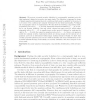Free Online Productivity Tools
i2Speak
i2Symbol
i2OCR
iTex2Img
iWeb2Print
iWeb2Shot
i2Type
iPdf2Split
iPdf2Merge
i2Bopomofo
i2Arabic
i2Style
i2Image
i2PDF
iLatex2Rtf
Sci2ools
122
click to vote
TCC
2009
Springer
2009
Springer
Composing Quantum Protocols in a Classical Environment
We propose a general security definition for cryptographic quantum protocols that implement classical non-reactive two-party tasks. The definition is expressed in terms of simple quantum-information-theoretic conditions which must be satisfied by the protocol to be secure. The conditions are uniquely determined by the ideal functionality F defining the cryptographic task to be implemented. We then show the following composition result. If quantum protocols 1, . . . , securely implement ideal functionalities F1, . . . , F according to our security definition, then any purely classical two-party protocol, which makes sequential calls to F1, . . . , F , is equally secure as the protocol obtained by replacing the calls to F1, . . . , F with the respective quantum protocols 1, . . . , . Hence, our approach yields the minimal security requirements which are strong enough for the typical use of quantum protocols as subroutines within larger classical schemes. Finally, we show that recently ...
Classical Two-party Protocol | Cryptographic Quantum Protocols | Cryptography | Respective Quantum Protocols | TCC 2009 |
| Added | 25 Nov 2009 |
| Updated | 25 Nov 2009 |
| Type | Conference |
| Year | 2009 |
| Where | TCC |
| Authors | Serge Fehr, Christian Schaffner |
Comments (0)

